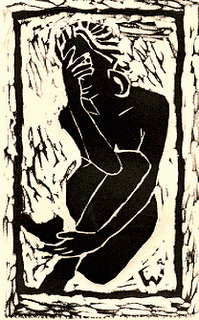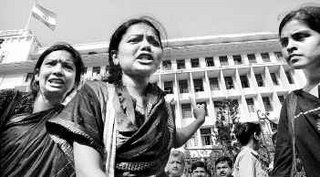 Shame: India and its Dalits
Shame: India and its DalitsA blog post by Rahul Pandita
Bhaiyyalal Bhotmange cannot sing. His wife or daughter were not models, walking over the ramps in fashion shows. In fact, nobody from the Bhotmanges, a Dalit family living in Khairlanji village of Maharashtra’s Bhandara District, could speak his mind on Umrao Jaan in front of titillating television mikes.
Probably, that is why what happened to the family never made headlines. But what 50-year-old Bhaiyyalal witnessed on September 29 is something that will continue to haunt him for the rest of his life. It was towards the evening when a mob of upper-caste landlords descended upon the Bhotmange household. In their ramshackle hut, Bhaiyyalal’s wife, 44-year-old Surekha was preparing evening meals while her bright 18-year-old daughter Priyanka studied in one corner. Surekha’s sons, Roshan, 23, and Sudhir, 21, sat nearby.
As the landlords dragged the mother, her daughter and two sons outside, Bhaiyyalal was about to reach his home. But when he heard the cries of his family, he halted and hid behind a hut.
Surekha and Priyanka were stripped naked and taken to the village chaupal, 500 meters away. For almost next two hours, they were beaten up, bitten and raped by the mob. One of them was even strapped to a bullock cart. After more than an hour of rape and plunder of their bodies, Surekha and Priyanka died. Eye-witnesses have told the Police that sticks were pushed into their private parts, and even after they died, some people continued to rape their bodies.
Roshan, who was blind, and his brother were beaten up and stabbed to death. Their bodies were thrown at various spots in the villages. The next afternoon the Police fished Priyanka’s body out from a canal nearby.
“ I was too scared; I was almost paralysed,” says Bhaiyyalal, who has now fled to another village, fearing that the upper-caste landlords may even kill him, too. “Nobody, except a single woman from the village, tried to stop the mob. The lone woman was silenced by the men with a slap,” recalls Bhaiyyalal.
For almost a decade, the Bhotmanges had tried to lodge a Police complaint. A portion of their 5-acre land had been grabbed by the upper-caste landlords of the village. Even after that, they would not let the Bhotmange family live in peace with the remaining land. So for years, the Bhotmanges had to tolerate incidents of tractors mowing down the standing crops in their fields.
The Police chose not to pay any attention to their grievances. The upper-caste landlords even tried to prove that Bhaiyyalal’s wife, 44-year-old Surekha had an affair with a Police Patil (honorary Policeman) in neighbouring Dhusala village, Siddharth Gajbhiye, who was actually her cousin. On September 3, the landlords beat up Siddharth so badly that he had to be admitted in a hospital. Fearing for his life, Siddharth’s younger brother got him admitted in a hospital which is 100 kilometres away. The hospital, realizing that it was a medico-legal case, informed the local Police, who in turn informed their counterparts in Khairlanji. This time, the Police was forced to lodge a case and 14 arrests were made. Despite repeated threats, Surekha identified the culprits in the identification parade. All of them were released on bail on September 29.
The same evening, they decided to take revenge. Siddharth Gajbhiye called up the local Police station, six kilometers away, at 6.15 pm. One head constable visited the spot at 8.30 pm, but did not register a report. The next day, Bhaiyyalal Bhotmange went to the Police station to file a report, but he was not taken seriously by the SHO. It was much later that an FIR was lodged. Both policemen have been suspended for not responding, and a case has been registered against the head constable. The postmortem report, intriguingly, said that the two women were not raped.
“Doctors were managed and the police bribed.” This is what Surekha’s nephew has alleged, in a report submitted to a social organization. “Everyone in Kherlanji knows what happened with my aunt and cousins, everyone was a witness to the heinous crime,” he has said in his statement. After pressure from social activists, the bodies were exhumed, and another autopsy was conducted. But that too has not been able to establish rape. Some of the perpetrators of crime are believed to be politically well-connected. Social activists are now demanding the arrest of the doctor who conducted the first postmortem.
“It was a gory dance of death, the height of brutality,” says the district Superintendent of Police, Suresh Sagar. He agrees that the Police did not act well in time. He also clarifies that Surekha did not have any illicit relationship with Siddharth Gajbhiye.
The Police have arrested 44 people so far, including 2 women. Police sources now say that some of them have confessed to the crime.
Priyanka was a bright student and was preparing for her HSC. She was also a NCC cadet and wanted to join the armed forces. “Had it been a case of rape or murder of a model like Jessica Lal, the media would have gone overboard. But in this case, not even the National Commission for Women has reacted so far,” says Dr. Rupa Kulkarni, a Nagpur-based social activist. “This is because Dalits are considered worthless in this country,” she adds. After the protests against the incident turned violent, the State government has finally woken up from its deep slumber. Maharashtra's Chief Minister visited the village and offered a government job to Bhaiyyalal. But Bhaiyyalal declined the offer, saying that all he wants is the guilty to get severe punishment. The question is: Will justice be delivered?
(Rahul covered this incident during his recent visit to Nagpur. This article has appeared in the recent issue of The Sunday Indian)
 Khairlanji and the English press
Khairlanji and the English press

 Nobel Peace Prize winner itching for a fight
Nobel Peace Prize winner itching for a fight



